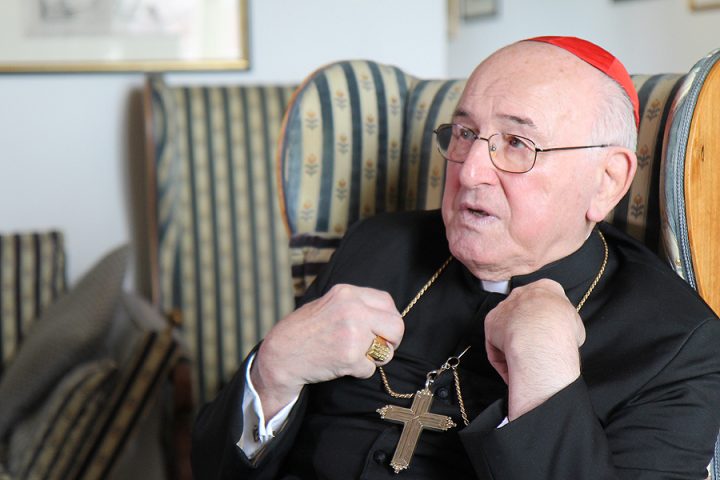Catholic Cardinal: To Claim Adultery Okay Under Certain Circumstances is ‘Heresy’ and Causes ‘Schism’

Trump Has Lunch With US, SKorean Troops
November 7, 2017
This Organization Gives $1,000 to Parents of Stillborn Babies
November 7, 2017
Photo: Cardinal Walter Brandmuller.
By Michael W. Chapman, CNSNews, November 6, 2017
 Commenting on the confusion caused by Pope Francis’ letter on the family, Amoris Laetitia, German Cardinal Walter Brandmuller said that if adultery was “always and under all circumstances morally reprehensible,” then to say that adultery is okay today under certain circumstances is “heresy” and leads to “schism” in the Church.
Commenting on the confusion caused by Pope Francis’ letter on the family, Amoris Laetitia, German Cardinal Walter Brandmuller said that if adultery was “always and under all circumstances morally reprehensible,” then to say that adultery is okay today under certain circumstances is “heresy” and leads to “schism” in the Church.
Cardinal Brandmuller is one of four cardinals who wrote a letter with questions, dubia, to Pope Francis, asking him to clarify certain points in Amoris Laetitia. The Pope has never responded, despite several queries by the cardinals.
One of the most disputed sections in the Pope’s exhortation is in Chapter Eight (and footnote 351), which states that a person living “in an objective state of sin” — such as adultery caused by divorce and civil remarriage — “which may not be subjectively culpable,” can grow in “grace and charity” and, “in certain circumstances, this can include the help of the sacraments.”

Pope Francis. (Screenshot YouTube)
In other words, couples living in adultery may receive Communion in certain circumstances, which is an idea the Church has never taught.
Cardinal Brandmuller, in an Oct. 28 interview with the German newspaper Frankfurter Allgemeine Zeitung, as translated by the website One Peter 5, said, “[H]e who claims that one may enter a new relationship while one’s own lawful wife is still alive is excommunicated because this is an erroneous teaching, a heresy.”
“Whoever does make such a claim [is excommunicated],” said the cardinal. “And he who simply practices it [adultery] is gravely sinning.”
Cardinal Brandmuller stressed that one who has committed adultery must repent of his sin by going to Confession, express true remorse, resolve not to commit the sin again, and receive absolution from the priest. Adultery is not a state one may live in perpetually and receive Communion regularly.
A person who is in “grave sin may only go to Communion if he previously has done penance, has confessed his sins, and has been absolved,” said the cardinal.
If a person thinks they can ignore the church’s teaching on adultery, or any other serious sin, and then go to Communion is committing “heresy,” he explained, “and that means exclusion from the Church because one has left the common foundation of Faith.”

(Screenshot YouTube)
Cardinal Muller went on to say that he agrees with the interpretation of liberal German theologian Magnus Striet, who says Amoris Laetitia does change the Church’s teaching.
“He is, of course, right,” said the cardinal. “There are indeed still people who can think. I have the great concern that something is going to explode. People are not stupid.” Cardinal Brandmuller then mentioned that there is a document beyond the dubia with 870,000 signatures, including those of 50 leading scholars, theologians, and priests asking the Pope to answer the questions about Amoris Laetitia.
Pope Francis has not responded to this second document, known as the Filial Correction.
Commenting further on the dubia that he and three other cardinals sent to Pope Francis earlier this year, Cardinal Brandmuller said, “To put it simply, it is here about the question: Can today something be good which has been a sin yesterday?
“Additionally, the question is being presented as to whether there are truly – as the continuous teaching says – acts that are always and under all circumstances morally reprehensible? Such as in the case of the killing of an innocent person – or also adultery, for example? That is where it leads to.”

The Vatican and partial view of St. Peter’s Square, Rome, Italy. (Screenshot YouTube)




